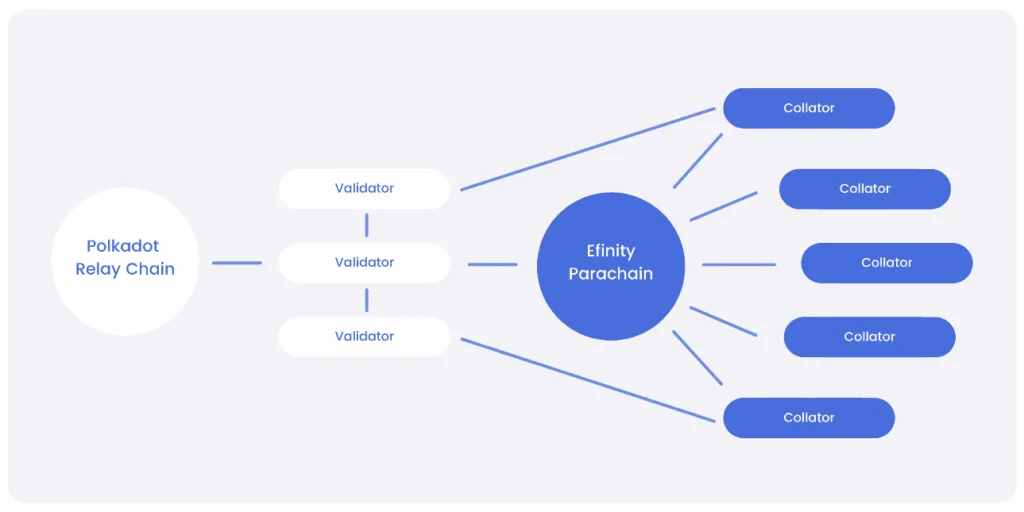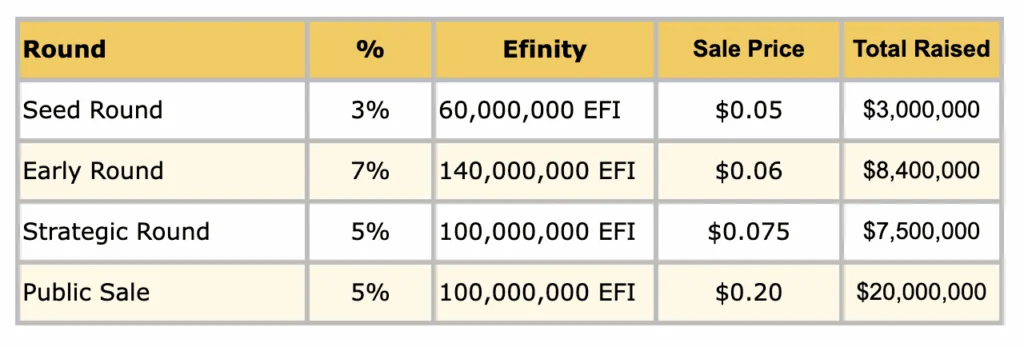What is Efinity (EFI)?
Efinity (EFI) is a next-generation blockchain for digital assets that has been developed by Enjin (ENJ) – An ecosystem that lets the consumer buy, sell, and distribute Non-Fungible Token (NFT) items, which was started in 2009 and has more than 20 million gamers around the world.
EFI is a parachain for NFT that was built with a consensus algorithm based on Polkadot Relay Chain validators in conjunction with the Web3 Foundation, allowing it to have its economic framework, data, and state.
For your better understanding, Polkadot is a blockchain platform that enables a fully decentralized web of parachains in which people fully own their identity and data.
The Polkadot is outlined to run two kinds of blockchains:
Relay Chain:
The heart of Polkadot, accountable for the network’s distributed security, agreement, and cross-chain interoperability.
Parachains:
Main blockchains that utilize the transfer chain’s calculating sources to verify that transactions are safe and reliable.

Efinity will operate as a parachain using Polkadot Relay Chain validators, allowing it to become a self-governing financial structure, data, and environment. Aside from that, it also is attempting to address blockchain issues such as interoperability, scalability, agility, safety, isolation, and many others. The Efinity’s collator nodes are responsible for processing transactions on the Efinity parachain and the network pays out EFI (its native token) from Collator Pool to them.
How does Efinity (EFI) function?
As we have mentioned above, the EFI blockchain will serve as a parachain in the Polkadot ecosystem. As a result of Polkadot’s interconnection technology, Efinity will be one of a hundred blockchains that can communicate with one another, allowing developers of other parachains to incorporate Efinity (EFI) NFT into their ecosystem while knowing that they will also work in different blockchains.
Efinity has been working on developing a paratoken that will be similar to the ERC-1155 tokens they created for Ethereum. EFI will be the first paratoken in reality. The Efinity blockchain will process approximately 700 transactions per second with a confirmation period of six seconds.
Efinity will act as a primary platform for all fungible and non-fungible tokens. Tokens from any other chain, such as the prominent ERC-721, ERC-1155 and ERC-20 standards, are accepted by the paratoken standard. This standard is necessary as it will generate network effects by attracting growing numbers of transactions. The network that solves the problem of enabling the pricing and exchange of NFTs will inevitably gain traction. To get a bid, tokens do not need to be advertised for sale or even exist on the network. In reality, users can be rewarded for initiating bid orders or ask orders and increasing network utilization by initiating transactions that other users can complete.
This method will automatically encourage buyers and sellers to join the network and produce network effects by encouraging users to begin transactions. Third-party apps that allow the users to transfer inside other platforms such as games or that serve as NFT markets are expected to expand on this capability.
What Makes Efinity (EFI) Special?
EFI is special because it prioritizes token generation, transfers, and purchases since it aims to serve NFT Highway rather than general-purpose computing blockchain. Hence, the EFI transaction cost is much smaller, which will allow the users to focus on their favourite items without thinking about how the network works.
Efinity (EFI) Features and Advantages
According to the EFI official whitepaper, EFI provides the same features that are offered by another handful of NFT marketplaces, such as fast transactions & low fees, fuel tanks and efinity swap.
- Fast Transactions & Low Fees
Based on the EFI whitepaper, EFI can process 700-1,000 transactions per second (the Ethereum network presently processes approximately 15 TPS). When the EFI and Polkadot runtime code is optimized, TPS may be increased in the future. Plus the transactions are verified in under six seconds, allowing for the fast response times required by mainstream applications.

Aside from that, a fee payer signature may be included in a transaction before broadcasting, allowing someone else to acknowledge responsibility for fees through a signature. This can be beneficial for businesses and producers who want to reduce transaction costs for their customers.
- Fuel Tanks
Fuel Tanks are special discrete accounts that are used purely for transaction fees. Developers can choose to subsidize expenses for their customers by depositing EFI tokens into a Fuel Tank that they control. They can whitelist specific tokens, tags, transaction types, or individuals for use.
- Efinity Swap
Efinity Swap is an automatic conversion mechanism that improves the efficiency of paratoken exchanges by enabling an automatic conversion of paratokens into another paratokens to fulfil current bids and ask for orders. These swaps are made possible by existing bids and ask orders. The network allows for these automated exchanges for paratokens that meet a minimum number of Bids and Ask orders.
What is an EFI token?
As mentioned above, the EFI token is the main utility paratoken on the network, with 2,000,000,000 tokens.
For nominator staking and pools, 15% of the entire supply is set aside. These tokens are given out as a reward for helping to manage the parachain over the first 8-10 years.
On genesis, 3% was allocated to the decentralized treasury pool. 15% of the total EFI supply is set aside to autonomously reward collaborators and pools for significant contributions to the network, such as transaction processing, development of new modules, network maintenance and initiatives to extend the network. This section will be gradually unlocked over the course of several years until the entire token supply is depleted.
The EFI Token is used for all transaction fee payments on the EFI network in which the type of transaction determines the pricing and distribution of transaction fees. Any orders filled will incur a 2.5% fee will have to divide among four pools. Developers who create NFTs have the option to charge a fee for marketplace orders. This can be set to a maximum of 25% of the total cost.
Below is the detail of the EFI Token information:
- EFI token metrics
- Token Name: Efinity.
- Ticker: EFI.
- Deployment Network: Efinity.
- Relay Chain: Polkadot.
- Token Standard: Paratokens.
- Contract: 0x656c00e1bcd96f256f224ad9112ff426ef053733
- Token Type: Utility and Governance.
- Total Supply: 2,000,000,000 EFI.
- Circulating Supply: EFI has not launched yet.
- EFI Token Allocation
- Ecosystem: 35%.
- Staking & Pools: 15%.
- Company: 20%.
- Team: 10%.
- Seed Round: 3%.
- Early Round: 7%.
- Strategic Round: 5%.
- Public Sale: 5%.
- EFI Token Sales

How to buy EFI tokens
You can buy the EFI token through several ways, which can be through DEX and CEX platforms:
Conclusion
In summary, EFI could be a good investment since the future related to NFT seems bright. The affiliated relationship between Efinity and Enjin will democratize NFTs using micro-fees. It will be a game-changer for developers and businesses who require better performance on massive operations, making it a good and potential place to be invested.

